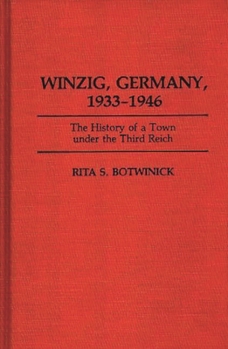Winzig, Germany, 1933-1946: The History of a Town under the Third Reich
This history of Winzig challenges the often-held view that Germany under Hitler resembled one vast concentration camp. Except for the Jews, the townspeople lived much as they had before 1933. A few Winzigers profited and a few suffered as a result of the Nazi regime, while most continued their nonpolitical daily lives. Only World War II itself effected serious changes. Winzig was a microcosm of Germany in that only a minority supported Hitler, and yet in twelve years no strong anti-Nazi movement developed. That fact constitutes an indictment against silent majorities everywhere.
Rita S. Botwinick's account of a small town examines how the Nazis achieved political power, the changes instituted by the New Order, the reaction and decimation of the town's Jewish families, the impact of the Russian invasion, and the expulsion of the German population by the Polish authorities. Botwinick discusses the integration of this expelled population into Germany west of the 1949 Polish/German border without the creation of long-term problems--a remarkable achievement which has been neglected in chronicles of the postwar era. The story of Winzig is told through narratives of the lives of ordinary individuals and describes their behavior in the face of extraordinary circumstances.Format:Hardcover
Language:English
ISBN:027594185X
ISBN13:9780275941857
Release Date:August 1992
Publisher:Praeger
Length:176 Pages
Weight:0.77 lbs.
Dimensions:0.4" x 5.5" x 8.5"
Customer Reviews
0 rating





